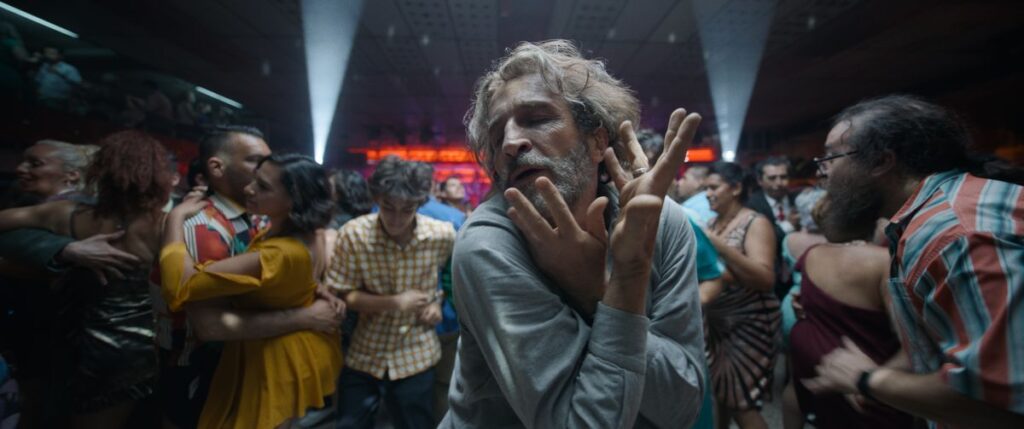The subtitle of Bardo, the Netflix film from The Revenant and Birdman director Alejandro G. Iñárritu, is A False Chronicle of a Handful of Truths. But as long as we’re attaching pretentious postscripts, a quotation from Macbeth might be more appropriate: Sound and Fury, Signifying Nothing. A lot happens in Bardo, much of it surreal. Elaborate musical numbers, dream sequences, alternate histories, and chronological hiccups all factor into this sprawling, whimsical, personal film. But once the lights go up and the spell is broken, all that striking imagery ends up feeling remarkably empty.
To be fair, Bardo’s main character, celebrated Mexican journalist and documentarian Silverio Gama (Daniel Giménez Cacho), is also tormented by the void. He’s a man without a country, both in the sense that he splits his time between Mexico and the United States, and in a more abstract, existential way. Silverio used to be a newsman. Then he left his job and his country to strike out on his own as a documentary filmmaker. He’s found tremendous success in his new career, but something’s still troubling Silverio. He’s deeply insecure, but wildly egotistical at the same time. That sounds like a contradiction, but it’s familiar to anyone who’s ever known any artist, ever.
Bardo feels like a sketchpad or a series of snapshots, knitting together mundane moments with profound to form a loose narrative about Silverio’s life. The story opens with the long-ago loss of a stillborn child, Mateo, whose death still follows Silverio and his wife Lucia (Griselda Siccliani) around. Literally — Lucia walks out of the delivery room still trailing the boy’s umbilical cord, which stretches to interminable length, hanging out of the bottom of her hospital gown like a tail.
Photo: S. De R.L. de C./Limbo Films
From there, Iñárritu jumps forward to Silverio’s imagined reunion with an old frenemy, in which he’s humiliated on Mexican television by a former colleague who accuses him of being too good for his home country. Then there’s another jump, this one taking us to the meat of the story: Silverio is the first Latin American journalist to receive a major award from an American association, and he’s being fêted on both sides of the border to celebrate.
The events in the film suggest Iñárritu is couching an autobiographical story in elaborate, stylized metaphor. He isn’t a documentary filmmaker, but his Academy Awards — Best Director for The Revenant; Best Picture, Director, and Screenplay for Birdman — provide a neat, convenient parallel to Silverio’s big honor. There’s also the fact that Cacho looks like Iñárritu, and that the men come from the same privileged economic and social class.
Iñárritu does flagellate himself for his bourgeois sins: Silviero fancies himself a man of the people, but he fails to defend an Indigenous maid when she’s treated poorly at a posh beach resort. He demands to speak to a manager every time an encounter isn’t going his way. He dismisses his son’s identity crisis — the boy was raised in both Mexico and California, and feels like he doesn’t belong in either place — while nursing his own musings about what it means, really means, to be Mexican.
In the end, that particular line of thought leads to Silverio having a smoke with Hernán Cortés (Ivan Massagué) atop a pile of Aztec corpses in the central square of Mexico City, a scene that pulls back to reassure viewers that they shouldn’t worry, it’s all a movie. Just a bit of playing pretend, that’s all. The sequence’s scope and artistry are impressive, but as the culmination of 165 minutes of navel-gazing (and that’s the cut-down version: the original cut ran 179 minutes), it’s an anticlimactic note. Similarly, a surrealist early scene of Silverio riding the L.A. Metro with axolotls swimming in a foot of water at his feet eventually comes back around. But again, the payoff takes too long to be worth the wait.

Photo: S. De R.L. de C.V./Limbo Films
And these are two of the more cogent structural connections. Much of Bardo is made up of scenes that don’t relate to each other in any meaningful way, and the film’s many time-jumps and flights of fancy obscure any emotional truths that lie at its center. The only sentimental thread that does come through is Silverio’s love for Lucia. But — with no offense meant to Siccliani, or her presumed real-life counterpart — there’s nothing revolutionary about a one-dimensional hot wife who gazes adoringly at the camera, is always up for a topless romp, and doesn’t have much else to say.
In an era where the egos of powerful men in the entertainment industry have taken a beating, it’s an achievement of sorts to make a film that’s this self-indulgent. The thanks (or blame) for this goes to Netflix, one of the last places where an Oscar-winning auteur can scoop up a pile of money and do whatever the hell he wants with it. The egotism is so potent, in fact, that it begins to erode the film’s humble façade after a while, raising the question of whether this is actually self-effacing satire, or simply the year’s shallowest collection of deep thoughts. Either way, the lack of clarity indicates a failure to communicate.
A self-proclaimed truth-teller who lies to himself to protect his ego is a funny idea, and early on in the film, Silverio says, “If you don’t know how to play, you don’t deserve to be taken seriously.” But in spite of Iñárritu’s soft protestations, Bardo does take itself seriously. And its self-awareness is so limited as Iñárritu drones on and on, the inverse relationship between his own self-seriousness and how seriously the viewer is inclined to take him reaches a breaking point. The film’s title refers to a Buddhist concept of the liminal space between death and rebirth, which ends up resonating in a different way than its creator may have intended: Bardo tries to do so much that in the end, it ends up saying nothing.
Bardo: A False Chronicle of a Handful of Truths is currently rolling out in wide theatrical release ahead of its Netflix release on Dec. 16.

